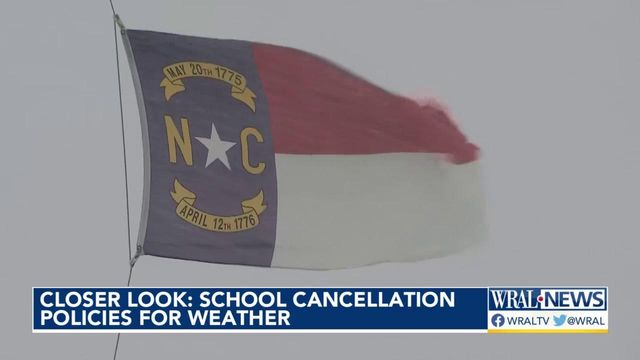Schools closed for weather: How do NC districts make the decision?
It seems schools close for severe weather more and more these days. Have you ever scratched your head wondering why your child isn’t in school even though the weather isn’t that bad?
Districts close schools in North Carolina for a variety of weather-related reasons, including tornadoes, hurricanes, snow, ice and even classrooms with no power or air conditioning.
When Tropical Storm Idalia passed through the state in August, multiple school districts canceled classes even though their counties weren’t under a tropical storm watch or warning, or even a wind advisory.
WRAL meteorologist Kat Campbell asked districts what guidelines they follow in making the decision to cancel school in severe weather. The thought process varies from county to county.
If wind is too strong, school buses won't run
Dr. Steve Ellis, superintendent for Nash County Public Schools, said a lot has changed over the past decade when it comes to canceling school in North Carolina.
Ellis and other district leaders refer to guidelines in a 9- to 10-page plan in the event of any kind of bad weather.
"Back when I was in school, it was only because of a snow day ... but with the tornadoes and hurricanes and all the things we’re getting now … every time we just build on this plan," Ellis said. “We’ve got about 11 members on this weather committee that have to be assembled in here to make decisions," Ellis said.
Ellis explained the decisions made in Nash County are not based on whether a tropical storm watch or warning is in place but instead on how strong winds are blowing.
“The biggest thing is if winds are sustained at 30 mph, we can’t send [school] buses out," Ellis said. "That’s the first thing we ask our emergency management teams in Nash County: tell us about the winds.”
WRAL News reached out to other school districts, including Wake, Chatham, Johnston, Durham and Cumberland counties, about their guidelines.
A spokesperson for the Wake County Public School System said, with Idalia, the weather forecast and staffing shortages, specifically for bus drivers, were considered before making the decision to close.
The other districts did not provide specific information about what factors they used to make the call to close.
Why are schools closed when weather is bad?
There are no federal or state recommendations on canceling school due to wind-related conditions.
School districts, emergency management leaders and the National Weather Service all confirm those standards vary county by county.
For example, Cumberland County Schools uses wind gusts, not sustained winds, and their threshold is 40 to 45 mph gusts.
According to the Wake County school district, it is generally unsafe for buses when the wind is sustained at 30 mph and/or gusting over 40 mph. The district also closely monitors the power outage potential since that is another consequence of strong winds.
Wake County leaders aim to make the decision to close schools before 9 p.m. the day before. If the decision has to be made the day of, they will try to do so before 4:45 a.m.
Nash County said they don’t have a set deadline for the call, but they always try to make the call the night before.
In the end, the safety of students is top priority.
“There’s a kid sitting somewhere that’s going to catch a bus [and] they are sitting in the rain, gusts," Ellis said. "I always think about that, and it helps me with my decisions."
The WRAL Severe Weather Center can usually predict 24 hours ahead of time how a tropical system could impact North Carolina.
Winter weather, including snow, is a different story.
"The difference between 5 miles can be the difference between plain grass and a sledding hill," Campbell said. "Those last-minute forecast tweaks can complicate the schools’ decisions, and I think most parents would agree they tend to err on the side of caution."













